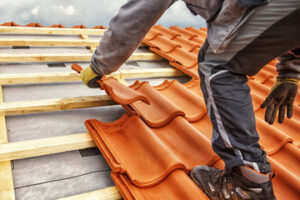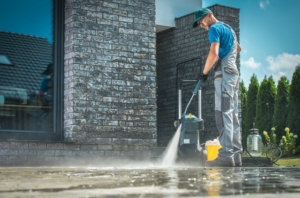A roof is one of the most important parts of your house. It protects you and your family from the elements, including rain and snow.
There are many different types of roofing. Each has its unique look and style, but they all protect the same thing: your home. Contact Anderson Roofing and Exteriors now!

Shingles, which cover the exposed portions of a roof, are the stalwart guardians that protect a structure from rain and other weather conditions. Unfortunately, shingles can suffer from many problems. If you have a problem with your shingles, you must talk to your contractor and the manufacturer. They may help you determine whether the problem is an environmental issue or a product defect.
A common problem with shingle roofing is the formation of blisters. Blistering is the result of volatiles escaping from a shingle’s asphalt mix. Historically, mistakes in shingle ingredient mixing caused these gases to migrate toward the shingle’s surface and create a bubble-like blister. Today, ingredients are metered and mixed automatically, and this problem is much less likely to occur.
Another common issue with shingle roofs is the loss of granules. The granules are small bits of rock and ceramic that provide color to the shingle and protect it from UV radiation. If your shingles are missing a significant amount of granules, it’s important to call for a roof inspection and replacement as soon as possible.
If a shingle becomes loose or is damaged, it can expose the underlayment and allow water to enter your home. This can be particularly damaging if the shingle is covering a seam between two others or is at a low point where water and debris collect.
Generally, shingles have a lifespan of 15 to 20 years. Depending on the quality of the shingle and your roofing system, the lifespan can be significantly longer.
In addition to the usual wear and tear, shingles can also be damaged by hail and other environmental factors. In some cases, the damage can be so severe that it requires a complete roof replacement. When this occurs, finding a professional roofing contractor with the right experience and skills to replace your shingles properly is critical. Ensure the contractor is licensed, insured, and recommended by friends and family. You can also check out their reviews and ratings on referral websites.
Roofing underlayment is an essential component of any roof, providing a barrier against moisture that can cause damage to the deck and living spaces below. It is installed directly on the roof deck before shingles are added, and it helps to prevent water infiltration from causing wood rot and mold growth.
Several types of underlayment are available, each with advantages and disadvantages. Some are better for certain types of roofing, while others may be more suitable for different climates and weather conditions.
Underlayment is usually made of a material like felt or synthetic polymer. It is a thin layer that protects the roof from harsh weather elements and makes it easier to install other roofing materials. Some underlayment types also offer a reflective coating, which can reduce cooling costs in hot climates and help to create a more comfortable indoor environment.
If a roof is not properly protected by underlayment, the shingles could become damaged or lose their adhesive properties. This can lead to leaks, which can cause structural damage and even flooding in the home. In some cases, local regulations require underlayment to maintain a shingle warranty.
A poor-quality underlayment can be easily torn during installation, providing a weak barrier against water infiltration. In addition, it has a limited tolerance for UV rays and is susceptible to mold and mildew. Poor underlayment can also degrade rapidly, causing damage to the roof deck.
Choosing the right underlayment for your roof depends on many factors, including your installation needs, the climate where you live, and the type of roofing material you plan to use. For example, if you have a metal roof, you will need underlayment to handle the heat and prevent rusting.
Some underlayment options are self-adhesive, eliminating the need for nails or fasteners during installation. Synthetic underlayment is a newer option that is more durable than traditional felt. This type of underlayment has a synthetic base coated with asphalt to increase its waterproofing properties, and it can be reinforced with coarse woven material for additional strength. It is more expensive than traditional felt, but it can be much more effective in protecting your roof from the elements.
A roof’s flashing is the last defense against water penetration into a home. This is accomplished by installing thin pieces of impervious metal at all the points where a wall or roof intersects or projects outward, like chimneys, dormers, vent pipes, and window openings. Flashing is made from malleable metals like aluminum, copper, and galvanized steel and comes in various shapes and sizes to match the specific area in which it’s being installed.
Roof flashing is installed in areas of the roof that are prone to leaks, such as valleys and where two roofs meet. There are several types of flashing, including step flashing, counter-flashing, and roll valley flashing. The most common type of flashing is shaped like an L, though other forms include V-shaped and T-shaped. These are often used around chimneys, plumbing vents, and skylights but can also be found in different areas where pipes and roof protrusions occur.
Flashing is also placed under shingles where they meet walls or other roof structures. This helps prevent moisture from getting into a house or other building through these areas, which is a vital part of any roofing system.
If the flashing is damaged or deteriorates, it may be necessary to replace it. This can lead to costly repairs and even a full roof replacement in some cases. Fortunately, it’s easy to check for damage or deterioration in flashing. You can do this by examining the exposed portions of it.
When a roof is installed, the flashing is typically coated with a protective zinc layer to help prevent corrosion. This coating is very important for the longevity of the flashing, and it’s important to examine this layer regularly. If it becomes corroded, this can cause holes in the flashing, allowing water to seep through the roof and into a house or other structure below. This is an extremely serious issue, and it should be fixed immediately. You should also check the flashing for dents and other signs of wear and tear. These can include cracks in the corners, holes, and rust spots. These should be addressed right away, as they can quickly lead to more major problems like leaks and mold.
Ventilation is bringing fresh air into a space or building and removing polluted air. It helps regulate indoor temperatures, reduces energy costs, and protects roofing materials. Without proper roof ventilation, hot air can build up in the attic, causing moisture problems and shortening the lifespan of your roof.
A proper ventilation system consists of intake and exhaust vents placed strategically throughout your attic and roof area. These vents work in tandem to create a continuous cycling of air that keeps your attic cool and prevents moisture build-up within the roof.
Intake vents are typically installed in the soffit, while exhaust vents are located near the roof peak. Proper ventilation is essential for both summer and winter. In the summer, heat from your home warms the attic air, and adequate ventilation allows this hot air to escape through your vents instead of re-heating your living spaces. In the winter, ventilation prevents moisture from forming inside your roof, which can cause ice dams and leaks in the home.
Whether you’re installing a new roof or replacing your old one, installing an efficient ventilation system is vital to the longevity and health of your home. Contact your local roofing contractor to learn more about the options available for your home’s specific needs.
The most common type of roof vent is the ridge vent, which is cut into the roof ridge and runs the length of your attic. This type of vent is popular because it keeps the look of your home and can be used in conjunction with gable vents to provide a balanced ventilation system. Other roof vents include soffit vents, box vents, and gable vents. Each type has pros and cons, depending on your climate, attic style, and roof.
